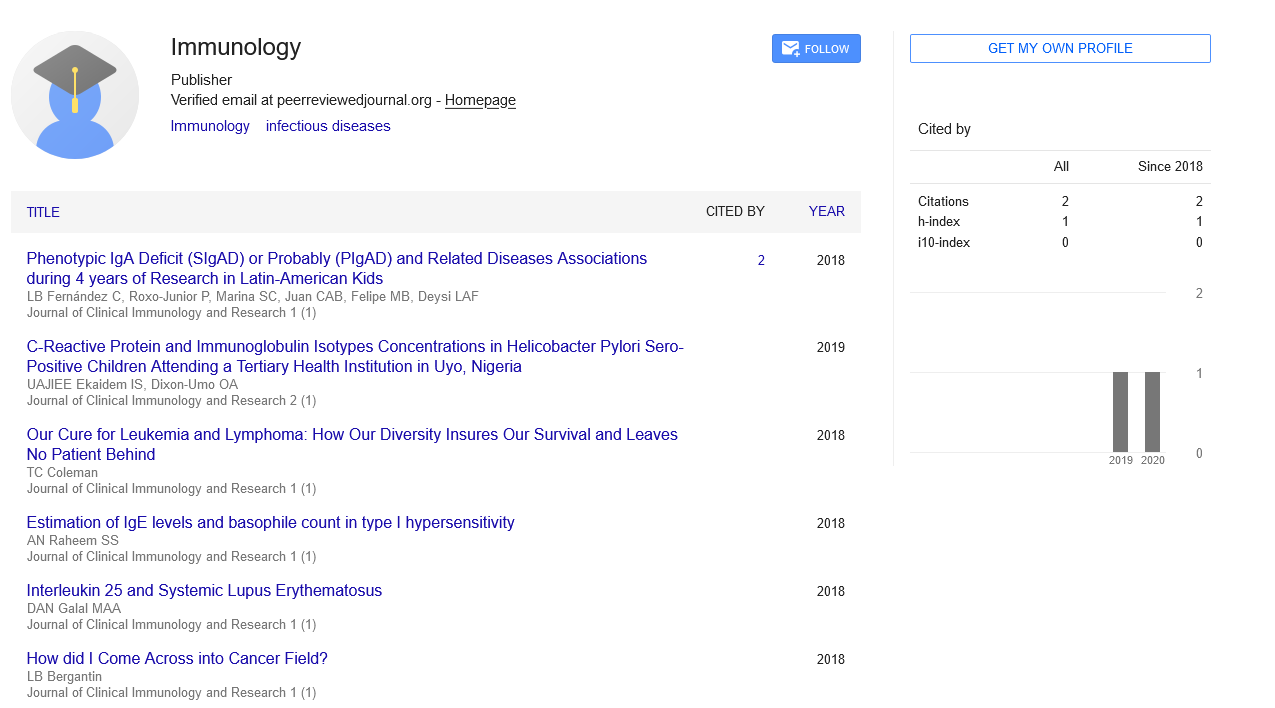Opinion Article, J Clin Immunol Res Vol: 6 Issue: 1
Impact of Immunization and Vaccines on Contagious Diseases
Jacobus Ghaffari*
1Department of Maritime Studies, University of Piraeus, Athens, Greece
*Corresponding Author: Jacobus Ghaffari
Department of Maritime Studies,
University of Piraeus, Athens, Greece
E-mail: jacoghaff@gmail.com
Received date: 19 March, 2023, Manuscript No. JCIR-23-99623;
Editor assigned date: 22 March, 2023, PreQC No. JCIR-23-99623 (PQ);
Reviewed date: 05 April, 2023, QC No. JCIR-23-99623;
Revised date: 12 April, 2023, Manuscript No. JCIR-23-99623 (R);
Published date: 19 April, 2023, DOI: 10.4172/JCIR.100071
Citation: Ghaffari J (2023) Impact of Immunization and Vaccines on Contagious Diseases. J Clin Immunol Res 6:1.
Description
Contagious diseases pose a significant threat to public health, causing widespread illness, disability, and even death. Immunization and vaccines have played a vital role in combating contagious diseases by preventing their transmission and reducing the burden of infections. Vaccination programs have been instrumental in controlling and eradicating several contagious diseases throughout history.
Historical significance
Immunization has a long and successful history in controlling contagious diseases. Landmark achievements such as the eradication of smallpox and the near-elimination of diseases like polio and measles demonstrate the transformative power of vaccines. These successes have saved countless lives and reduced the global burden of contagious diseases.
Prevention of infection
Vaccines work by stimulating the immune system to recognize and mount a response against specific pathogens. They introduce harmless fragments of the pathogen or weakened forms of the pathogen itself, triggering an immune response without causing the disease. This primes the immune system to recognize and neutralize the actual pathogen if encountered, preventing infection or reducing its severity.
Reduction in disease burden
Immunization programs have led to a significant reduction in the incidence and severity of contagious diseases. Vaccines have been developed and deployed against a wide range of pathogens, including measles, mumps, rubella, diphtheria, pertussis, tetanus, influenza, hepatitis, and Human Papillomavirus (HPV), among others. By immunizing populations, the burden of these diseases has been significantly reduced, resulting in fewer cases, hospitalizations, and deaths.
Herd immunity
Immunization not only protects vaccinated individuals but also contributes to the concept of herd immunity. When a significant proportion of the population is immunized against a contagious disease, it creates a barrier that prevents the pathogen from easily spreading. This indirect protection benefits vulnerable individuals who cannot be vaccinated due to medical reasons, such as infants, the elderly, or those with compromised immune systems.
Control and eradication.
Immunization has been instrumental in controlling and even eradicating contagious diseases. Vaccination campaigns have successfully eliminated diseases like smallpox, and efforts are underway to eradicate polio. Through strategic vaccination programs, disease transmission can be interrupted, reducing the reservoir of the pathogen and eventually leading to its elimination from a geographic region or globally.
Challenges and continuing efforts
Despite the remarkable impact of vaccines, challenges persist in achieving universal immunization coverage. Vaccine hesitancy, misinformation, limited the access to vaccines in some regions, and outbreaks of vaccine-preventable diseases highlight the ongoing need for education, outreach, and equitable distribution of vaccines. Ongoing analysis and development are also vital to address emerging infectious threats and improve vaccine efficacy and safety.
Conclusion
Immunization and vaccines have revolutionized the prevention and control of contagious diseases. Their impact on reducing morbidity, mortality, and disease burden cannot be overstated. Through vaccination, diseases that were once prevalent and devastating have been brought under control or eliminated. However, continued efforts are required to ensure universal access to vaccines, combat vaccine hesitancy, and address evolving infectious threats. Investing in immunization programs and promoting vaccine confidence are essential for sustaining and expanding the positive impact of vaccines on contagious diseases and safeguarding public health.
 Spanish
Spanish  Chinese
Chinese  Russian
Russian  German
German  French
French  Japanese
Japanese  Portuguese
Portuguese  Hindi
Hindi 